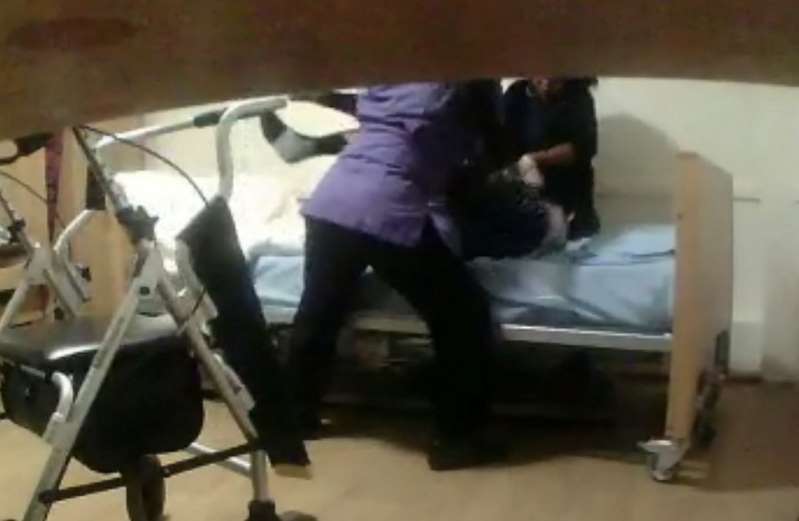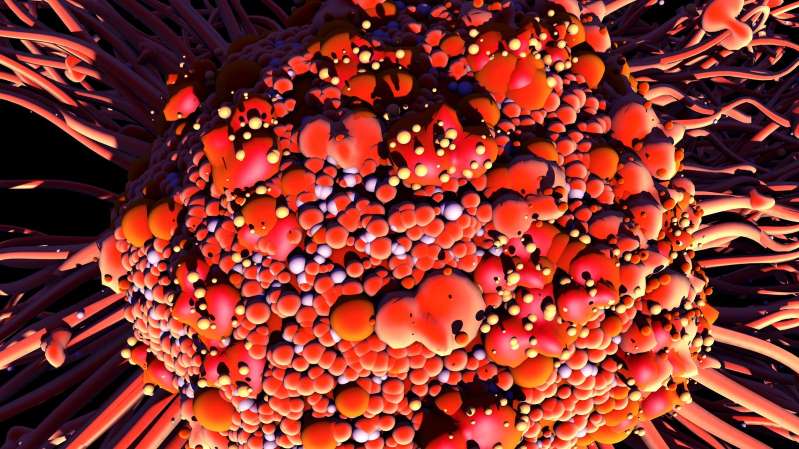Hidden camera footage shows care workers drag distressed dementia sufferer across room









Hidden camera footage shows care workers drag distressed dementia sufferer across room
Disturbing footage shows care home staff dragging a distressed dementia sufferer across her room and leaving her in a urine-stained bed. Michael Lanera captured the video on a hidden camera he fitted in his 85-year-old mother's room after he suspected she was being mistreated.
The footage shows nurse Mamello Herring and care worker Maria Jackson dragging Angelina Lanera from the toilet back to her bed.Mrs Lanera can be heard screaming and crying in distress, but the workers continue to manhandle her using a banned “drag lift” technique.
The technique involves someone putting a hand or arm under the person’s armpit and can result in injuries to those involved. They then left her in the urine-stained bed and clothes, Bradford Crown Court heard on Friday.
Prosecutor Wayne Jackson said on December 1, 2018, Mr Lanera visited his mother, who has since passed away, in her care home in Halifax, West Yorkshire and found her lying in a urine-stained bed still in her clothes from the day before.
When he checked the camera he discovered the horrific footage.When the pair were questioned Herring said she knew “drag lifting” was not permitted because it was unsafe and she had been taught that in training sessions, the court heard.
Jackson also accepted her actions had been wrong and it went against her training.Herring, 55, of Leeds, West Yorkshire, pleaded guilty to a charge of ill treatment by a care worker, which can carry a maximum sentence of five years in jail.

She was given an 18-month community order and told to do 250 hours' unpaid work for the community. ackson, 41, of Hipperholme, West Yorkshire, pleaded guilty to common assault and also received an 18-month community order. She was ordered to do 180 hours' unpaid work.
Although Herring had been suspended from the nursing register, she had continued to work in the care sector, the court heard. Jackson had been doing kitchen work at other care homes during the COVID pandemic.
Herring expressed remorse for her offending and said she was ashamed of her conduct shown on the footage. Jackson’s barrister said she had been relatively inexperienced and junior at the time of the offending.
She was said to have handled a difficult situation badly and it was a great regret. The Recorder of Bradford Judge Richard Mansell QC said “drag lifting” was specifically excluded because it was potentially unsafe never mind the indignity it involved.
He told them: “I totally reject any suggestion that either of you were not sufficiently trained or experienced to understand that. “You had the training, however, and to drag a lady as vulnerable as her from the toilet, with her knickers around her ankles and then to manhandle her on to and up her bed, whilst she was moaning and crying in distress, is a gross failure by both of you to care for this lady.”
He accepted that dealing with such vulnerable residents was challenging, but added: "You both deserve to have lost, or to lose, your jobs because this kind of lack of humane treatment has no place in any care home setting.”
The judge said Mrs Lanera had been found by her son in urine-soaked clothing and the pair would have got away with what they had done if he had not installed the camera. Judge Mansell said many right-thinking members of the public would consider a short sentence of imprisonment was deserved by both defendants.
But he concluded the offending had not been wilful or deliberate ill treatment. He said it had been “grossly negligent behaviour” brought about by a lazy, sloppy failure on the part of both defendants to take their time and follow proper caring procedures in her care plan.
He added that if it had taken up to half an hour to use a Zimmer frame, chair or hoist to carefully lift Mrs Landera back into bed and get her settled, that should have happened. Speaking after the sentencing, Mr Lanera said he was “angry” at the pair who should have been caring for his vulnerable mother, who has since died.
He said: “I'm really angry with them for what they did to my mum. “Mamello has set up her own healthcare business. This is an insult to my late mother. "She had also been warned before about her actions when she lifted a patient with a broken leg at another care home.
“I believe in second chances and we all make mistakes. But she hasn't learnt from her mistakes and now she's been able to set up a business in healthcare. “She shouldn't be able to work in care again. “Jackson is working in a kitchen, at least she is away from vulnerable people there.”
Reference: Yahoo: Victoria Bell
60% Indians still hesitant towards Covid-19 vaccine, shows survey









60% Indians still hesitant towards Covid-19 vaccine, shows survey
The percentage of Indian citizens hesitant to take the Covid-19 vaccine has dropped from 69 per cent to 60 per cent in 3 weeks, a survey conducted by LocalCircles revealed.
According to the findings, now 60 per cent polled citizens are hesitant to take the Covid-19 vaccine immediately.
In October 2020, LocalCircles survey had indicated that 61 per cent of citizens were hesitant to get the vaccine shot. This percentage declined to 59 per cent in the November survey.
Thereafter, the uncertainty over side-effects and efficacy of vaccines, vis-a-vis reports of adverse events during its trial, startle several citizens. This eventually resulted in an increase in the percentage to 69 per cent in the survey conducted in December. This number was maintained till the first week of January.
The percentage of hesitant citizens declined from 69 per cent in the first week of January to 62 per cent during the week starting from January 18 to 60 per cent during the week of January 25.
WHAT IS THE REASON FOR HESITANCY?
The survey showed that uncertainty over side effects is the top reason for vaccine hesitancy amongst Indian citizens.
While 59 per cent of polled citizens said "side effects not known" was the primary reason for their hesitancy towards Covid-19 vaccine, 14 per cent said that uncertainty around the efficacy of vaccines is the reason why they were hesitant.
Only 4 per cent said they don't need the vaccine because Covid-19 pandemic is going away anyway and other 4 per cent believed that the current vaccine may evade upcoming strains of the novel coronavirus and hence, they were hesitant.

When people were asked about their willingness to take the vaccine immediately, 36 per cent said they have already taken either a shot of Covishield or Covaxin, or will take it.
Another 4 per cent of the polled Indians said they will take the vaccine whenever it is available via private hospitals or channels.
Further breaking down the poll, 28 per cent of citizens said they will wait up to 3 months and then decide; 16 per cent said they will wait up to 3 to 6 months; 7 per cent said 6 to 12 months; 3 per cent said they will wait for more than 12 months and then decide in 2022; 6 per cent said they will not take it at all.
This tally showed that 60 per cent of citizens are still hesitant to take it immediately.
WHO SAID WHAT
The last LocalCircles vaccine hesitancy survey released on January 19, 2021, indicated that 62 per cent of citizens were still hesitant towards Covid-19 vaccination.
The majority of professionals in the survey maintained that they are worried about side-effects, or not sure about the vaccine's efficacy.
Even a survey amongst healthcare professionals in India indicated that 55 per cent will either defer the vaccination or haven't yet decided what to do.
Since October 2020, LocalCircles has been collecting responses from citizens to know their approach towards taking Covid-19 vaccine.
The survey aimed to understand if the percentage of reluctance or hesitancy has increased, declined or remains unchanged along with reasons for hesitancy.
Amid all developments, LocalCircles has conducted another survey to measure the change in the last one week.
The survey received approximately 17,000 response from citizens located in over 213 districts of India.
INDIA'S VACCINATION DRIVE
India kicked off the world's largest Covid-19 vaccination, with frontline workers being the first to get the vaccine shot.
Nearly 20 lakh frontline health workers in India have been inoculated with one of the two vaccines approved by the Drugs Controller General of India (DCGI) -- Covishield and Covaxin -- so far. Meanwhile, less than 1,000 adverse events have been reported.
India's vaccination drive has also been the fastest with over 10 lakh (or 1 million) vaccines administered in the first 6 days. In comparison, the United Kingdom took 10 days to reach the million mark, while it took the USA 18 days to reach the same milestone.
In a bid to drastically reduce fears over side effects and efficacy of these two vaccines, Prime Minister Narendra Modi and many chief ministers and Members of Parliament above 50 years of age are likely to take the vaccine in the second phase of the drive around May 2021.
Referencee: IndiaToday: Milan Sharma
Scientists develop ultrafast laser system to remove cancers more precisely













Scientists develop ultrafast laser system to remove cancers more precisely
A new laser system that may revolutionise the treatment of cancers and help surgeons remove them without damaging healthy tissue, is being developed by scientists.
Experts at Heriot-Watt University in Edinburgh are working on the system based around ultrafast picosecond lasers that deliver energy in a series of pulses one trillionth of a second long.
Professor Jonathan Shephard, who is leading the project, was given £1.2 million by the Engineering and Physical Sciences Research Council (EPSRC) to develop the treatment.
He said the system has proven successful on colorectal cancers in the lab.

"We proved in the lab that our laser system can remove cancer cells in a way that restricts damage to the surrounding, healthy cells - within the width of a human hair," he said.
Prof Shephard explained this happens because the laser pulses are so short and there is no time for heat to burn the surrounding tissue, which is what happens with current surgical tools.
He added: "We're building on our understanding of lasers in colorectal cancer surgery towards clinical application, and working on adapting it for brain, head and neck cancers, where it could have huge benefits for patients."
"The most important principle of any cancer surgery is to ensure that all cancer cells are removed; failure to do so will result in the cancer coming back."
He added that even microscopic loss of healthy tissue can lead to severe consequences, including impact on quality of life.
The scientists will also focus on developing a flexible, optical fibre-based system that can target and remove cancer cells two orders of magnitude smaller than current technology.
Professor David Jayne, a consultant surgeon at Leeds Teaching Hospital NHS Trust, said: "Surgical lasers open up exciting new approaches for cancer surgery.
"The precision of a laser combined with imaging to accurately discriminate cancer from normal tissue will greatly enhance the ability of surgeons to completely remove cancers with minimal side-effects for patients."
The team will be working on developing the system over the next three years.
Reference: Sky News:m Lucia Binding, news reporter
Covid news – live: Hotel quarantine plans set to be approved as Hancock warns NHS ‘stretched to limit’











Covid news – live: Hotel quarantine plans set to be appk warns NHS ‘stretched to limit’
Boris Johnson is expected to approve plans to force some travellers arriving to the UK to quarantine in hotels to limit the spread of new coronavirus variants.
The prime minister will discuss the proposals with senior ministers onTuesday before a final decision is made at a meeting of the Covid-O meeting.
Various options are said to be on the table, but Whitehall sources suggested ministers may opt for a more limited system after aviation leaders warned introducing tougher border rules would be "catastrophic" for the industry.
The officials said a less sweeping option would apply only to British residents returning from countries with more contagious variants - such as Brazil, South Africa and Portugal.
It comes after health secretary Matt Hancock warned the NHS is “stretched to the limit” as the number of coronavirus patients in intensive care and on ventilation has reached the highest level of the pandemic so far.
Articles - Most Read
- Home
- LIVER DIS-EASE AND GALL BLADDER DIS-EASE
- Contacts
- African Wholistics - Medicines, Machines and Ignorance
- African Wholistics -The Overlooked Revolution
- African Holistics - Seduced by Ignorance and Research
- The Children of the Sun-3
- Kidney Stones-African Holistic Health
- The Serpent and the RainBow-The Jaguar - 2
- PART ONE: DIS-EASE TREATMENT AND HEALTH-3
- 'Tortured' and shackled pupils freed from Nigerian Islamic school
- King Leopold's Ghost - Introduction
- PART ONE: DIS-EASE TREATMENT AND HEALTH-4
- PART ONE: DIS-EASE TREATMENT AND HEALTH-2
- PART ONE: DIS-EASE TREATMENT AND HEALTH-5
- African Wholistics - Medicine
- Menopause
- The Black Pharaohs Nubian Pharaohs of Ancient Egypt
- The Mystery System
- PART ONE: DIS-EASE TREATMENT AND HEALTH-6
Who's On Line?
We have 155 guests and no members online
Ad Agency Remote
Articles - Latest
- The Male G Spot Is Real—and It's the Secret to an Unbelievable Orgasm
- Herbs for Parasitic Infections
- Vaginal Care - From Pubes to Lubes: 8 Ways to Keep Your Vagina Happy
- 5 Negative Side Effects Of Anal Sex
- Your Herbs and Spices Might Contain Arsenic, Cadmium, and Lead
- Struggling COVID-19 Vaccines From AstraZeneca, BioNTech/Pfizer, Moderna Cut Incidence Of Arterial Thromboses That Cause Heart Attacks, Strokes, British Study Shows
- Cartilage comfort - Natural Solutions
- Stop Overthinking Now: 18 Ways to Control Your Mind Again
- Groundbreaking method profiles gene activity in the living brain
- Top 5 health benefits of quinoa
- Chromolaena odorata - Jackanna Bush
- Quickly Drain You Lymph System Using Theses Simple Techniques to Boost Immunity and Remove Toxins
- Doctors from Nigeria 'facing exploitation' in UK
- Amaranth, callaloo, bayam, chauli
- 9 Impressive Benefits of Horsetail
- Collagen The Age-Defying Secret Of The Stars + Popular Products in 2025
- Sarcopenia With Aging
- How to Travel as a Senior (20 Simple Tips)
- Everything you need to know about mangosteen
